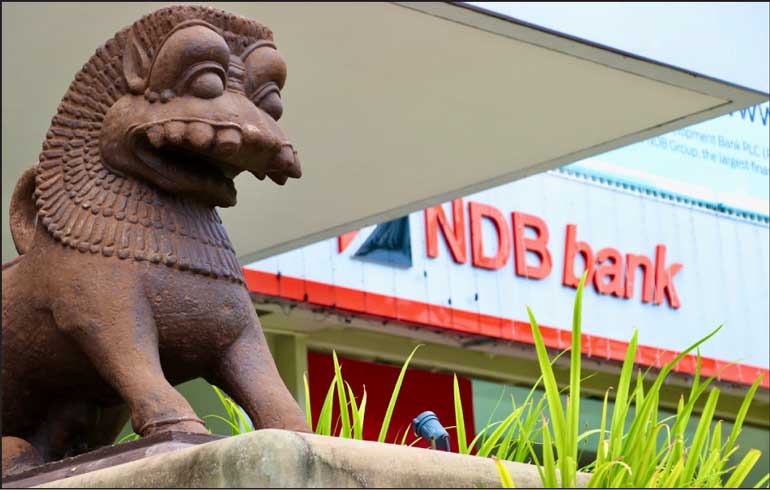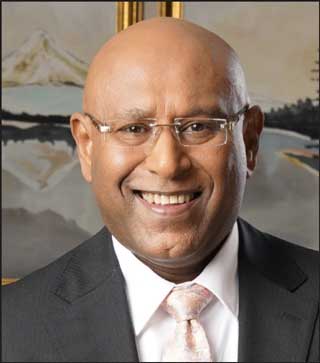Monday Feb 16, 2026
Monday Feb 16, 2026
Thursday, 3 June 2021 00:00 - - {{hitsCtrl.values.hits}}

NDB Group CEO Dimantha Seneviratne in this interview reflects on the success of the bank’s recent Rights Issue for Rs. 8 billion but succeeded in raising Rs. 9.5 billion, as well as the way forward
 |
| NDB Group CEO Dimantha Seneviratne
|
Q: You recently concluded a successful Rights Issue, why did you go for a Rights issue during a pandemic?
NDB is one of the most efficiently capitalised banks in the country. Despite the exponential growth the bank has produced, it also
generated sufficient return on capital to ensure that the bank’s capital adequacy levels are met. Hence the returns the bank produced on shareholders’ equity, reflected in its return on market value of equity at 27.3% prior to the Rights issues, was the highest among its peer banks. But this low level of capitalisation was not sufficient to meet the planned rate of asset growth of the Bank, hence the requirement for the capital infusion.
The Rights Issue was actually announced in October 2020 after the second wave. However in the mean time we were hit by the third wave, notwithstanding which the rights issue was a tremendous success. The timing was of a concern more from the convenience of the shareholders to participate than apprehension of shareholders not wanting to participate. We are very pleased by the confidence the investor community has in NDB and our growth plan. Despite the pandemic, the bank is confident of it will not fail the investors faith in delivering on their expectations,
Q: NDB Rights issue was announced for Rs. 8 billion but the bank raised 9.5 billion; how?
While the bank was planning the Rights Issue, we looked at cornerstone investors to come in knowing very well our growth plans. Norfund indicated their interest in taking up 10% of the issued share capital of the bank. Hence the bank entered into agreements with Norfund with appropriate market announcements to take up any unsubscribed shares there by reducing the level of dilution for the existing shareholders and any shortfall will be met by way of a Private Placement.
With the existing shareholders taking up over 83% of the rights, in order to accommodate the entire requirement of Norfund, the bank had to issue Private Placement shares at a 10% premium to the rights price for about 5% of their requirement. Hence around Rs. 1.7 billion of Private Placement shares was issued taking the total to Rs. 9.5 billion. All in all a good outcome in challenging times.
Q: Why were the Private Placement shares issued at a higher price that the Rights Price?
This was mainly to protect the interests of the existing shareholders as the private placement wold lead to a dilution of their stake. You will note that the Rights Price was arrived at based on a 10% discount on the then prevailing market price. The Private Placement was priced at a premium of 10% to the Rights Price. Hence the Private Placement was at the then prevailing market prices to ensure that Norfund does not get an advantage over the existing shareholders.
Q: With the Rights Issue behind you, what are the plans to use it?
The bank has drawn up a five-year plan till 2025 to steer its course. We plan to increase our penetration in key economic sectors to support the growth of the country, whilst ensuring that the portfolio is not overly concentrated on one sector. We also note the new sectors opening up, such as organic fertiliser manufacturing, boat building, techno cities, etc.
Development Banking is in our DNA, hence we intend to support financial inclusivity for women, the MSME sectors and budding entrepreneurs, particularly exporters of the country. Once the effects of the pandemic recede, the bank will be ready to forge ahead aggressively with its plans. Meanwhile, the bank will work towards supporting our clients to navigate the third wave and emerge with a sustainable business model.
Q: You have been championing technology adaptation, how does this fit in with your plans?
The current situation we are in now as a country cannot more strikingly exemplify the need to adopt more technology as a country. We have lagged behind long enough, now it’s forced upon us.
NDB has long-planned its technological platform, to ensure that the changing requirements can be met with agility and are scalable. Our growth will be underpinned by improving efficiency internally. This will be by means of adopting technology to carry out mundane and time consuming activities. Currently the bank has over 15 robots (RPAs) at work enabling it to increase the throughput without increasing head count. This efficiency is reflected in one of the best Cost to Income ratios in the industry.
We will continue to invest in technology to improve processes internally, while passing on this benefit to the customers as well. For example, we recently introduced Robo Calling to customers who have insufficient funds in their account to meet inward clearing cheques. While helping save staff time at a time like this, it gives customers time to fund the account.
Our push towards financial inclusivity is also technology driven, to ensure that while the bank is efficiently reaching its clients, it is also encouraging the clients to bank efficiently. One of the key initiatives here is the ERP solutions the bank is offering its MSME customers. This will enable the client to maintain their books in an orderly fashion and also share that information with the bank seamlessly. It becomes easy for the bank to make credit decisions; in fact this may lead to made automatic preapproved facilities as well.
Combining the power of workflows, RPAs and data, the bank will start offering tailor-made solutions meeting the clients’ lifestyle and financial choices. Since this will be across the NDB group, the clients will be able to seamlessly operate their banking accounts, manage their stocks and investments with NDB Securities and NDB Wealth. This will be via the NEOS App, one app for all your financial needs.
Q: What value addition is expected from Norfund?
The Nordic countries are quite advanced when it comes to technology adoption, supporting entrepreneurship, remote working, renewable energy, etc. We expect Norfund to bring on board the necessary expertise that the bank needs in these areas from a governance and leadership stand point. Also Norfund can give access to technical assistance for the bank to learn from the experience of Norway and help improve the bank’s management capability in these areas. Long-term funding is another area in which we expect Norfund to support the economy of the country.
Q: What is your expectation of the impact of the third wave on the economy?
This is a very critical juncture for the economy. The impact of the third wave is going to be worse than that of the first two due to the rate at which the virus is spreading, which might force the authorities to extend travel restrictions. This will impact the MSMEs and daily wage earners. The social impact could be wide-ranging. Further, we cannot afford the export industries to flounder; any travel restrictions should make special exceptions for these industries, airports and ports. We will have to continue to impose restrictions on imports to ease the pressure on the currency for some period and gradually loosen these controls.
The impact would also depend on how we manage the spread via lockdowns, etc., whilst allowing key sectors of economy to perform. Of course we have to extend some kind of moratoriums to distressed customers and support them at this critical juncture. I think if we act swiftly and collectively, with the immunisation program coming in, we can manage this situation soon and look forward to an economic revival soon.